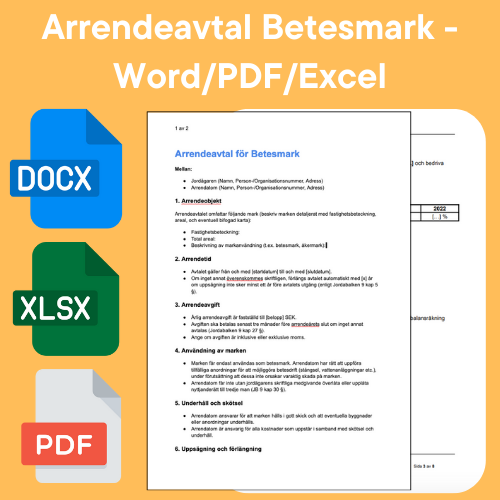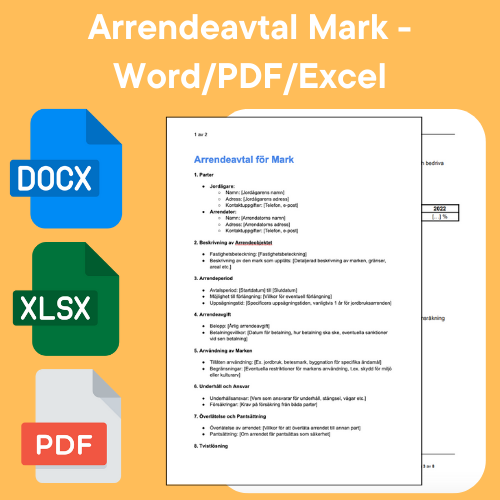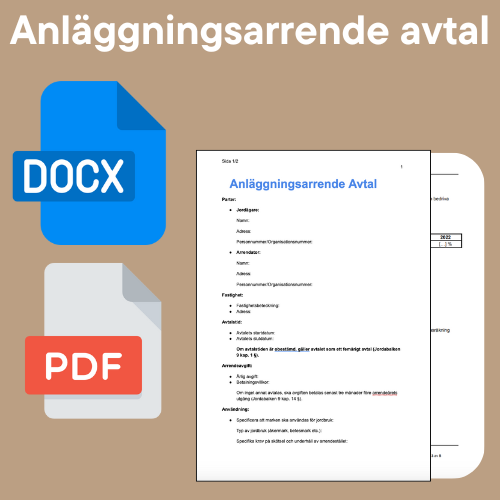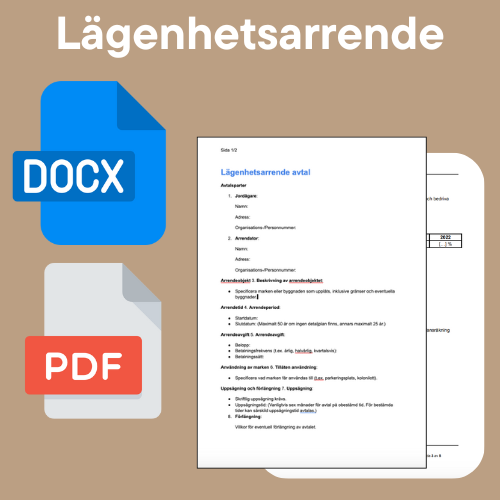What does the Jordabalken say about leases?
Share
What does the Jordabalken say about leases?
Introduction
The Land Code (JB) is the Swedish law that regulates usufruct rights to immovable property, including leases. Lease means that a property owner grants the right of use to part of his land in return for payment. There are different types of lease and the Jordabalken contains detailed provisions for each type. This article provides an overview of these rules, common mistakes and legal disputes that may arise.
Types of leases
According to the Jordabalken, there are four main types of lease:
- Agricultural lease: Grant of land for agricultural purposes. This may include arable and grazing land.
- Residential lease: Grant of land to build or maintain residential buildings.
- Facility lease: Grant of land to construct buildings or other non-residential facilities.
- Apartment lease: Grant of land for other purposes that do not fall under the categories mentioned above, e.g. holiday homes or allotments.
Rules for lease agreements
Lease agreements must be in writing and contain specific information about the lease period, lease fee and what is covered by the lease. The agreement must clearly specify the conditions for the use of the land and what happens when the agreement expires.
- Lease term: For agricultural and residential leases, the agreement must run for at least five years, unless otherwise agreed and approved by the lease committee.
- Rental fee: The fee must correspond to the market value and can be adjusted annually according to the consumer price index or another agreed method.
- Termination and extension: Termination must take place in writing and in good time before the end of the agreement. If the contract is not terminated in time, it is automatically extended.
Mandatory legal rules and exemptions
Certain rules in the Earth Code are mandatory, which means that they cannot be waived. This includes the requirement for a written agreement and certain minimum lease term requirements. However, it is possible to apply for an exemption from some of these rules at the tenancy board, if there are factual reasons.
Common mistakes and legal disputes
Common mistakes in lease agreements include not specifying all terms in writing, not applying for necessary waivers, and failing to update the agreement when conditions change. Legal disputes can arise if the parties disagree on the interpretation of the agreement or if changed conditions make it necessary to adjust the lease terms.
Examples of legal disputes:
- Extension of lease: A dispute can arise if the lessee believes that the agreement should be automatically extended, while the landowner wants to terminate it to use the land for another purpose.
- Change of lease fee: Disputes can arise if the parties cannot agree on how much the lease fee should be increased when extending the agreement.
Practical advice
- Always write a detailed agreement: To avoid misunderstandings and legal disputes, it is important to write a detailed agreement that specifies all the terms of the lease.
- Apply for necessary exemptions: If you want to deviate from mandatory legal regulations, make sure to apply for an exemption from the tenancy board in time.
- Document all changes: If conditions change during the lease period, e.g. if the lessee wants to construct new buildings, this should be documented and approved by both parties.
Summary
Leasing according to the Land Code is regulated by detailed legal provisions that aim to protect the rights of both the landowner and the lessee. To ensure a smooth tenancy, it is important to write detailed agreements, comply with the law's requirements and apply for the necessary exemptions. By avoiding common mistakes and carefully documenting all changes, you can minimize the risk of legal disputes.




